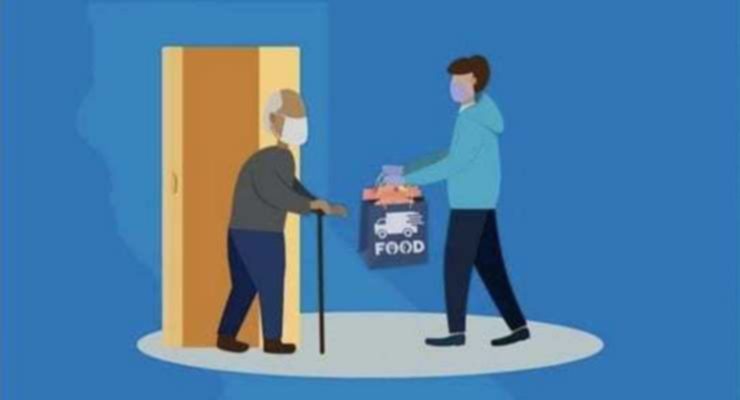
The City Council on Monday unanimously extended Pasadena’s participation in the state-administered “Great Plates Delivered” meals program through Feb. 7 — acknowledging that the city’s monthly outlay of about $466,000 will sting, but stressing the program’s importance in helping local restaurants survive the COVID-19 economic tumble.
The program, which has been up and running in Pasadena since May, delivers three meals a day – prepared by 21 local restaurants – to 235 seniors who are at high risk for coronavirus complications and are otherwise unable to access meals.
At the same time, councilmembers emphasized that the city needs to use the time between now and Feb. 7 to begin transitioning both the participating seniors and restaurateurs away from the program, whose costs, several councilmembers said, are unsustainable.
“I think this was a very innovative idea … but $460,000 a month is just enormous to our budget, it’s not something we can continue,’’ said Councilmember Margaret McAustin.
“I would like to see us continue this program and give staff the direction to continue with it until February and have that time to transition both the users and the providers out of the program.’’
Local seniors participating in Great Plates have numerous other food-delivery options, including an L.A. County version of the program. If those seniors apply to the county Great Plates program and are accepted, costs would not fall on the city.
However, Pasadena restaurants currently participating in the city program would be wait-listed by the county, potentially taking a major economic hit. That was addressed Monday when the council also approved sending a “strongly worded letter” to County Supervisor Kathryn Barger, urging that Pasadena restaurants participating in Great Plates be quickly incorporated into the county program after Feb. 7.
Great Plates is administered by the California Office of Emergency Services, but requires a local agency to pay the upfront costs. The city is eligible for reimbursement of up to 93.75 percent of the costs from the Federal Emergency Management Agency (75 percent) and the state (18.75 percent), leaving the city on the hook for just 6.25 percent of the program’s total costs.
But full reimbursement is not guaranteed. And what’s more, any reimbursement money will likely take years to land in city coffers, a real worry as the city’s 5 percent General Fund Operating Reserve balance – basically, its rainy-day fund — has fallen from $13.8 million to $1.7 million during the COVID crisis.
Those numbers come out of a report from Brenda E. Harvey-Williams, the city’s director of Parks, Recreation and Community Services, which administers Great Plates locally.
Since May, the city has approved almost $2.3 million in Great Plates outlays.
“It’s very, very expensive,’’ City Manager Steve Mermell said of the city’s participation in the program. “We do anticipate getting reimbursed by the federal government — at this point we have no indication that we won’t be reimbursed. But as we’ve discussed previously, we think it might take a very long time to get reimbursed. That could be a magnitude of years.’’
Mermell also said, “We’ve in effect burned through our unassigned fund balance. We’ve spent over $10 million of our 5 percent reserve. … On Thursday we’ll be providing an update on our financial circumstances to the Finance Committee. I’m anticipating a need to make some budget adjustments in January.’’
He did not elaborate further on those potential adjustments.
According to Harvey-Williams’ report, “Restaurant owners have expressed their gratitude for Pasadena operating a Great Plates Delivered program and allowing local restaurants to provide the food.’’
Harvey-Williams said that, as a result of Great Plates, 110 local restaurant workers have been rehired, and that three restaurants that had shut down have reopened, rehiring 15 workers. In addition, she said, three restaurants reported they would have been forced to close if not for Great Plates.
Those factors weighed heavily on councilmembers’ votes Monday.
“I do think this is a very expensive program when you look at it from a feeding perspective, but I think that’s not the goal of this program,’’ said Councilmember Andy Wilson. “It only feeds 235 adults, but for every two adults that are being fed … we’re keeping people at work in our restaurants.’’
“I am worried about the budgetary implications,’’ Wilson added. “I think I’d be more inclined to pull back from this program if the partial opening of our restaurants was more imminent. (But) I’m very concerned that that is not liable today (with coronavirus cases again spiking). … So I really look at this as a lifeline for many of these restaurants.’’
Councilmember Victor Gordo – the presumptive mayor-elect after last week’s voting – agreed. But he also warned that the city’s financial commitment to Great Plates cannot be open-ended.
“I’m conscious of the fact that there are 110 people who have been hired,’’ Gordo said. “(But) I’m wondering if we shouldn’t start thinking through how to transition. (Because) this is not sustainable, spending this much money. It’s just not sustainable, given the city’s finances.
“We need to ensure that people have the food that they need,’’ Gordo added, “but we need to start thinking through how some of these restaurants begin their own transition, so that they’re not reliant on city dollars that the city may need.’’
In January, the city will receive a $1.22 million allocation from the federal Department of Housing and Urban Development – so-called CDBG-CV funds, under the Coronavirus Aid, Relief, and Economic Security program – that can be used to boost local food banks and pantries. That would help seniors transition away from Great Plates, according to Harvey-Williams’ report.
“Once the food banks and pantries receive this funding, Feb. 7 could be an opportune time to discontinue Pasadena’s participation in Great Plates Delivered and (have) the seniors transition to one of (the other available) food options,’’ Harvey-Williams’ report says.
But that money would help only one side of the equation — leaving participating Pasadena restaurants at risk of losing significant income as they languish on the county program’s waiting list to participate.
“We don’t know how long the wait list is,’’ Harvey-Williams said Monday. “We don’t know if they (Pasadena restaurants) would ever get utilized by the county under the current configuration.’’
Addressing that, Gordo suggested that Mayor Terry Tornek write a “strongly worded” letter to Barger, urging that Pasadena restaurants be allowed to immediately participate in the county’s program rather than endure the county’s “bureaucratic red tape.”
Gordo’s suggestion was added to the measure approved by the council, and city staff is expected to draft the letter in the coming days.
“I think the county should include some of our restaurants in that program, as part of the transition,’’ Gordo said. “I think we should send a very strongly worded letter to our supervisor to that effect. It’s just wrong that they’re handling it this way, when I think it could be handled differently.’’














 0 comments
0 comments


